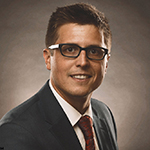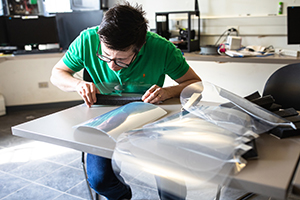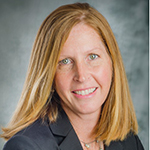By ELIZABETH GARONE
April 27, 2020
The acute shortages of personal protective equipment for medical workers around the country have prompted medical and research schools to raid their own supply cabinets, while their employees and students give of their time and ingenuity.

Klingensmith
In the case of one computer savvy health care spouse, stepping up meant moving from the virtual to the tactile. Neil Klingensmith, a computer science assistant professor at Loyola University Chicago, took it upon himself to manufacture face shields using some of the school's idle lab equipment. "I'm not an expert in the area of manufacturing, but I felt that it is important to contribute whatever I could," he said.
Klingensmith's wife works in a small nonprofit clinic in Chicago. Like so many other clinics and hospitals around the country, her clinic has been running low on masks, gowns, and face shields. "Many of her co-workers have immediate family members with coronavirus, and some have contracted it themselves," said Klingensmith.
Makerspace
Klingensmith recruited some volunteers to help him and they used an open-source template for making face shields that he found posted on the University of Wisconsin at Madison's engineering department's UW Makerspace website.

Neil Klingensmith, a computer science assistant professor at Loyola Medicine, is using the school's equipment to produce protective face shields for health care workers in the fight against COVID-19.
Lukas Keapproth/Loyola University
It turned out that the face shields are perfect for "impromptu production" because they are fairly easy to make with equipment that many people already have, said Klingensmith, and they don't need to be made in a sterile environment. Since the start of the COVID-19 pandemic and its related supply shortages, health care providers have come up with many substitutes and workarounds. The makerspace website offers a few suggestions of its own for novice face shield makers who find themselves without a laser cutter and a heat sealer. A scissors, an X-Acto knife, a stapler and Ziploc bags will do in a pinch.
Klingensmith's first batch of face shields will be delivered to three Chicago area hospitals that are part of Trinity Health's Loyola Medicine. He said his team plans to produce an additional 2,000 shields, which will be donated to Chicago area hospitals with the greatest needs.
Klingensmith has found obtaining the raw materials for the shields — a list that includes plexiglass, brow foam and elastic — to be challenging. "Elastic in particular is in short supply, presumably because it is used in making all sorts of personal protective equipment," said Klingensmith. He said industrial suppliers who sell elastic to manufacturers are sold out, but he's had some luck buying elastic from fabric wholesalers.
Loyola University Chicago's biology, chemistry and environmental science departments along with its Wellness Center clinic donated a pickup truck load of gloves, gowns and N95 masks to Loyola Medicine, according to Anna Rozenich, the university's director of communication. The medical schools' animal research division is decontaminating eight respirators to make them available for use by the health system.
Student-led effort
The Georgetown University School of Medicine in Washington, D.C, said when it put clinical training for medical students on hold in mid-March, six of its third-year medical students mobilized to create MedSupplyDrive, a national, student-led movement to collect and distribute supplies and funds to benefit frontline caregivers. Within a week of MedSupply's launch, the social media savvy group had recruited volunteers from 41 undergrad institutions and 66 medical schools in 37 states, according to a story on the Georgetown medical school's landing page, GMUC stories. In addition to picking up donations from research labs, its scouts collected personal protective gear from tattoo parlors, autobody shops and construction companies.
After all of Washington, D.C.-based Catholic University's classes were moved online, the Conway School of Nursing gathered personal protective equipment and other supplies from its nursing skills laboratory and gave the goods to Holy Cross Hospital, one of the school's clinical partners. While the Silver Spring, Maryland hospital currently has enough personal protective equipment and other supplies for its staff, the hospital's parent organization, Holy Cross Health, part of Trinity Health, is accepting donations and has set up a site to guide organizations that have reached out to help.
David Want, a nurse who is clinical coordinator for the nursing school, delivered 20 boxes of sterile surgical gloves, 61 boxes of non-sterile exam gloves, 13 containers of disinfecting wipes, and eight packages of isolation exam gowns to Holy Cross Health.
Since the students are all studying virtually, they are not using the materials, Patricia McMullen, the nursing school's dean, said in a press release. "We are, instead, working to ensure our colleagues in practice have much-needed equipment."
Following the nursing school's donations, Catholic University's environmental health and safety office delivered 1,100 surgical masks, 120 N99 masks, and 20 biohazard spill kits to Holy Cross Health. The school's chemistry department also donated gloves, gowns and disinfecting wipes.

Feliciano
Catholic University's contributions, along with ones from other local organizations and individuals, mean "everything" to Holy Cross clinicians, said Kristin Feliciano, Holy Cross Health's chief strategy officer. "This outpouring of support with notes of encouragement, statements of gratitude, supplies and sustenance to add to the health and well-being of Holy Cross Health colleagues is immeasurable."
Campus housing for clinicians
Another big challenge for health care providers on the frontlines has been housing. In some cases, they cannot go home, either due to concerns about exposing their families or, in some cases, having tested positive for COVID-19.
In response, Saint Louis University has opened its doors to doctors, nurses and other health care workers at SSM Health hospitals and employees of SLUCare, the university's academic medical practice. More than 180 rooms are available free of charge in one of the campus residency halls. Recently, six health care workers were staying there, according to a Saint Louis University spokesperson. The university also opened about 20 of its Grand Forest Apartments for medical staff who have tested positive for COVID-19 or are symptomatic and awaiting test results.
SLU suspended in-person classes in mid-March, and several hundred foreign students who remained on campus moved to a few residency halls. The living quarters for health care providers are isolated from core parts of the campus, minimizing risk of contact to the SLU community, university President Fred P. Pestello said in a written statement to the school's community. "I am proud that we are able to serve those who serve our community, selflessly, every day. This pandemic reminds us how critical it is to serve however we can," he wrote.